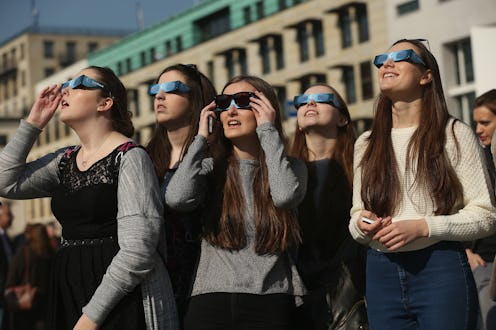
Most people alive today have never seen a solar eclipse in person, so with the upcoming one on Aug. 21, you might be wondering: Is the 2017 solar eclipse dangerous? While it's definitely not a sign of the apocalypse like some people fear, you do need to know how to view the solar eclipse correctly so you don't damage your eyes. "It is perfectly safe to watch the eclipse, so long as you follow the right protocols (and use common sense)," Sarah Kaplan reported for the Washington Post.
"Wear protective glasses whenever you're observing the sun — from the beginning of the eclipse, throughout the partial phase and up to the moment of totality. If and only if you are in the path of totality, it is OK to take your glasses off once the moon has completely covered the sun. But make sure to put those glasses back on before the sun reemerges."
In order to protect your eyes during the solar eclipse, you'll need eclipse-viewing glasses. "The only safe way to look directly at the un-eclipsed or partially eclipsed sun is through special-purpose solar filters, such as eclipse glasses, or hand-held solar viewers," NASA explained on its website.
If you don't have eclipse glasses, NASA advised that one alternative method for safe viewing of the partially eclipsed sun is pinhole projection, which you can do with your own hands, easy peasy.
Aside from making sure your eyes are protected if you're looking directly at the sun during the eclipse, viewing the solar eclipse is totally safe. And, while doomsday believers have said that the eclipse could poison your food, or harm pregnant women, most of these outdated ideas are based in ancient folklore, and NASA said that there is no scientific merit to these eclipse myths.
"Humans have watched eclipses since before the dawn of written history, and during this long span of time our scientific understanding of the physical world has grown enormously," NASA explained. "As a consequence, many of the older ideas we had about the causes and effects of total solar eclipses have been replaced by detailed physical explanations. Nevertheless, some older ideas seem remarkably resistant to replacement by the more scientifically-correct explanations."
While a calamity during a solar eclipse might make a good storyline for the X-Files, it's not something you have to worry about in real life. Because, science is real, and based on facts. Myths are unproven opinions.